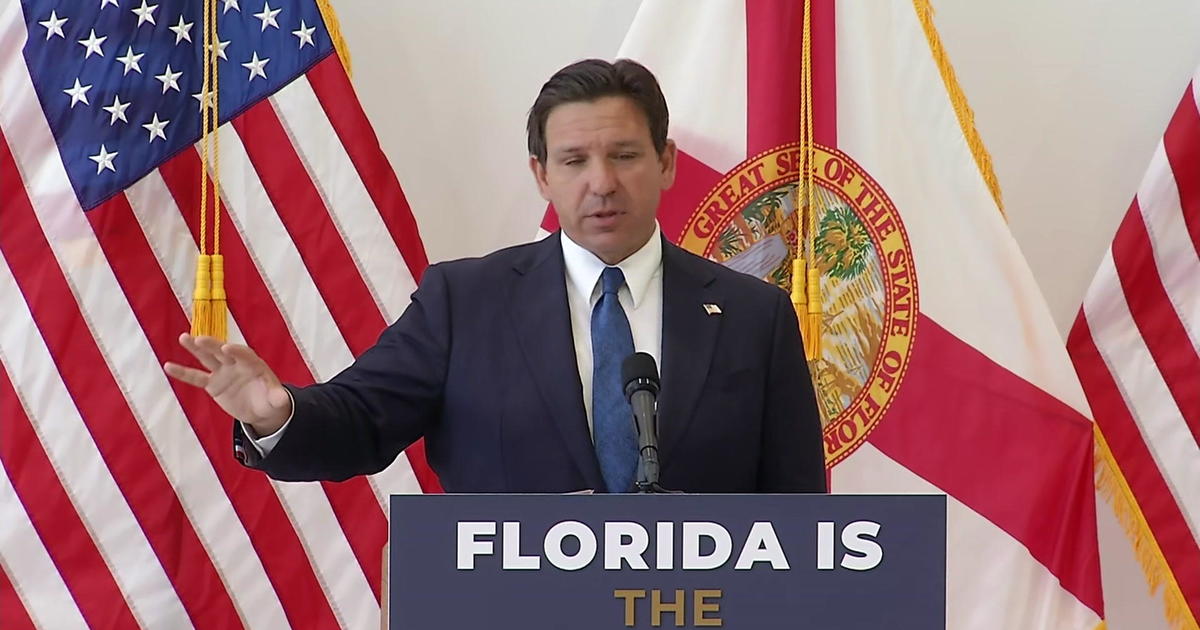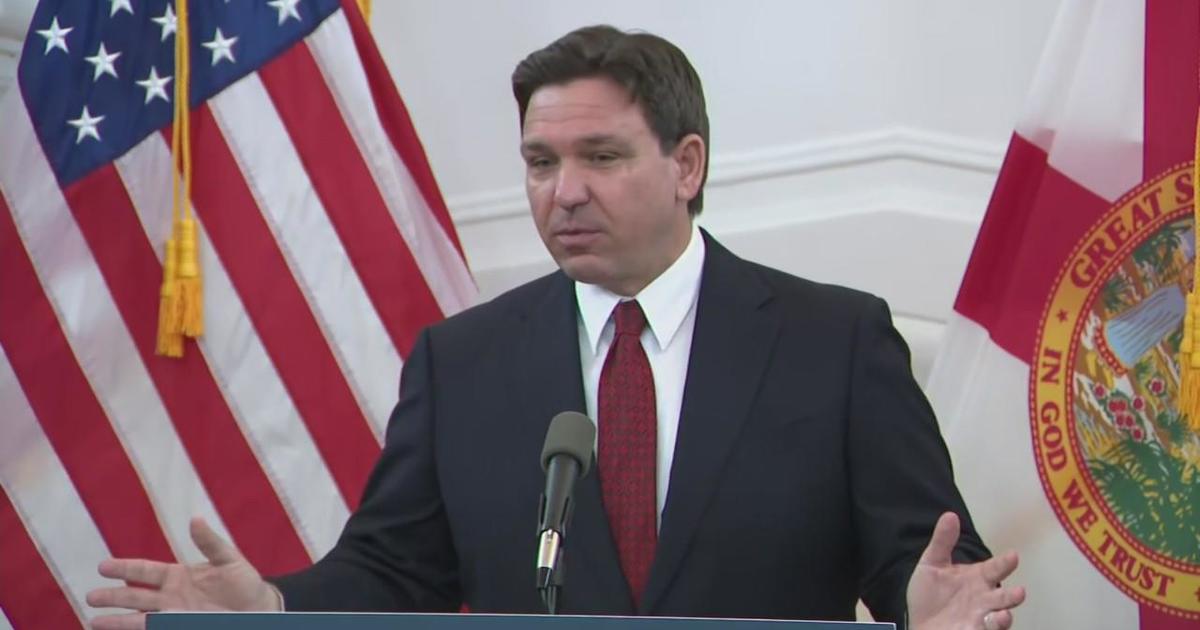Gov. Ron DeSantis Signs $101.5 Billion State Budget After Vetoing $1.5B
TALLAHASSEE (CBSMiami/AP) -- Florida Governor Ron DeSantis signed the $101.5 billion Florida budget on Wednesday, after vetoing $1.5 billion in federal money for an emergency response fund he said had strings attached that made it unusable.
DeSantis held the bill signing ceremony at a New Smyrna Beach restaurant and used the event to boast about his response to the coronavirus pandemic, saying fully opening Florida to business early helped the economy rebound faster and stronger than expected.
"A lot of people were trying to tell me to close restaurants like this last summer. We didn't do it. We kept business open, we got kids in school," DeSantis said. "The result was our economy really started to rebound."
DeSantis said the budget is focused on public safety, education, the environment and infrastructure while keeping Floridians as center focus.
"Once I sign this budget, we will be signing a budget that responsibly supports our men and women in law enforcement, our K-through-12 education students and teachers, conserves and protects our great environmental and natural resources throughout the state of Florida, but does so in a way that has the lowest per-capita tax burden of any state in the country," DeSantis said. "If you would have said that a year ago, no one would have believed that that would have been possible."
To view the Florida Leads Budget Highlights, click here.
"I'm proud to sign the Florida Leads budget that continues to exemplify Florida's continued resolve and unshakeable economic foundation, while establishing Florida's position as a nationwide leader in education, protecting our environment, creating a resilient economy, and ensuring public safety. We did all this while maintaining strong fiscal reserves and lowering taxes to make sure Florida families benefit this year and for decades to come."
The new budget will make the tax burden per capita the lowest of any state in the country and includes $169 million in tax relief, according to DeSantis. The spending per capita is also one of the lowest levels in the country.
The budget will support K-12 education with $22.8 billion, he noted, with a goal salary for all teachers in the state of $47,500.
About $120 million will be allocated to mental health, including $5 million allocated for youth mental health resources. DeSantis noted the best thing the state did for mental health was keeping the state open during the pandemic.
DeSantis vetoed about 150 line items pitched by individual lawmakers out of about 700 included in the budget. But the vast majority of money vetoed was $1 billion in federal dollars that would have gone to a new emergency fund in the governor's office.
The money for the fund would have come from the American Rescue Plan Act, a federal stimulus law signed in March by President Joe Biden. But DeSantis said federal guidelines dictated the money couldn't be set aside to address future needs and could only be approved through "normal procurement," defeating the purpose of the requested emergency-preparedness and response fund.
"If we were to go forward with it, we were going to run into (the) risk of having the feds come after us for it," DeSantis said.
Part of it was because the money would come in the form of grants and the state would have to go through normal bidding process to spend it.
"In an emergency situation, you don't have the time to do the normal procurement. You've got to do this very quickly. It would defeat the purpose to try to use it for emergency response if you have to go through all that bureaucracy," DeSantis said.
To view the veto list, click here
He said the state also wanted to use the money to meet future emergency needs, and the federal government said it couldn't be used for those purposes.
State Senate Democrats were quick to note the American Rescue Plan Act, which funneled billions of dollars to the state and bolstered the budget, was approved by congressional Democrats and Biden.
"A big chunk of the $10 billion from the federal stimulus act added to a bounty of transportation and economic development projects all over the state," Senate Democrats said in a statement. "The money even allowed the governor to dole out $1,000 bonuses to law enforcement, firefighters, and other front-line emergency workers. Unfortunately, as he took his victory lap to hand out the bonuses and brag about the many programs rescued as a result of the federal help, the governor never once directed thanks to those who made this possible."
The progressive group Florida Watch called the spending plan a "missed opportunity" to help more than just teachers and first responders with $1,000 bonuses as a reward for work during the pandemic.
"While children throughout our state are crammed into crumbling classrooms and portables, Republicans in Tallahassee refused to spend more than $3 billion that could have been used on much-needed maintenance projects in public schools," Florida Watch Executive Director Josh Weierbach said in a statement. "Instead, they raised taxes on every Floridian by $1 billion a year. They also turned away billions of dollars by refusing to become the 39th state to expand Medicaid, which would lower the cost of care for all Floridians and extend access to quality and affordable health care to over 800,000 workers."
The budget will take effect July 1 and, in part, funds the Department of Transportation's $9.44 billion work program; provides $75 million for the Visit Florida tourism-marketing agency; provides $74 million for the Job Growth Grant Fund economic-development program; and raises to $13 an hour the minimum pay of state workers.
DeSantis approved $22.8 billion in spending for public schools, which includes a roughly $464 million "safety net" to help school districts deal with potentially high enrollment counts.
The state is expecting 2.86 million students to enroll in public schools next academic year, after education officials and lawmakers grappled with enrollment declines during the pandemic. But it is still unknown if previously "missing" students might return to public schools, potentially pushing enrollment beyond the state's projection.
DeSantis also highlighted $550 million in the budget to continue increasing teacher salaries. That is in addition to one-time $1,000 bonuses for teachers and principals funded with the federal money.
For the environment, the budget includes $102 million for the Florida Forever land-conservation program and $300 million to acquire land to protect wildlife corridors. It also includes $415 million for Everglades restoration; $50 million for state parks; $500 million to address effects of rising sea levels; $500 million for wastewater grants; and $100 million to clean up an old phosphate plant in Manatee County that sparked concerns this year about a potential environmental catastrophe.
DeSantis already had approved a $169 million tax-relief package that includes three sales-tax holidays. That includes a 10-day disaster preparedness period that started Friday and allows shoppers to avoid paying sales taxes when buying hurricane supplies. The state also will hold a tax-holiday period in August for back-to-school shoppers and a "freedom week" holiday period in July for outdoor and entertainment purchases.
(© Copyright 2021 CBS Broadcasting Inc. All Rights Reserved. The Associated Press and News Service of Florida contributed to this report.)



